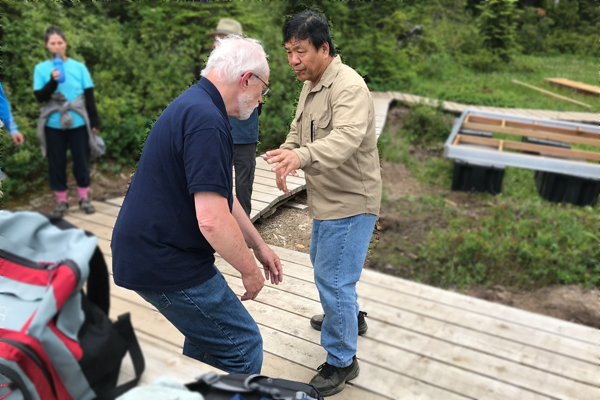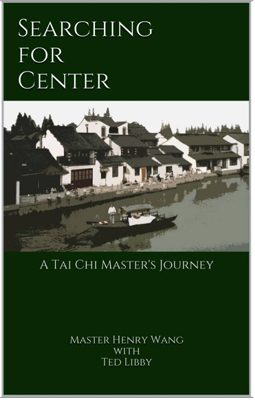|

Master Wang working with Ted Libby
 After 45 years of study and practice, Master Wang has written a book in collaboration with Ted Libby, a long-time senior student: After 45 years of study and practice, Master Wang has written a book in collaboration with Ted Libby, a long-time senior student:
Searching for Center - A Tai Chi Master's Journey is available as a paperback and Kindle ebook from Amazon.
"In Searching for Center Master Wang shares important lessons on a variety of topics including the basics of Tai Chi form work, the related Taoist philosophical principles, and the nuances of Tai Chi’s advanced internal practices. The book presents his Seven Principles of Tai Chi practice and introduces his innovative partner-work training method, Search Center."
Dr.
Peter Uhlmann, Master
Wang's most senior student, has written a book (see below) and
several articles about tai chi and Master Wang. Three of the
articles
are featured here.
Taijiquan: It is
Better to Receive than Give
In this article Dr. Uhlmann makes the important point that
in tai chi the ability to sense and receive an opponents energy
is of primary importance. A connection
must be made to the partner and to the ground before one can attempt to use
internal issuing power. It is in the harmony of receiving and giving that a
true connection can be found.
Back
to the Future: Wang Hui-Juin & Search Center
Here Dr. Uhlmann provides a detailed look at Master
Wang's philosophy and practice.
Tai Chi and Health
Written for the British Columbia Medical Journal, this article outlines a brief
history of tai chi and describes some of the research into the health promoting
benefits of tai chi.
The
Art of Shyun Chung Dao (revised)
In this updated article, James Milne,
one of Master Wang's senior students, writes about Tai Chi
and how Master Wang's unique philosopy is expressed through
the Tai Chi form and Search Center.
The
Art of Tai Chi
James Milne writes
about Master Wang's roots and philosophy. He explains the concept
of matching and how it exemplifies the practice of Search Centre.
Extend Your
Energy - Not Your Weight
Joe Zanbilowicz, a senior student of Master
Wang, shares some reflections with fellow students on how,
in doing search center, one contends with weight shift when
the extension of energy is required.
The Articles Above Require Adobe Acrobat Reader.
Flowing the Tai
Chi Way now available
online from Amazon or from
the author
contact Dr. Uhlmann for details
cost:
$20 CAD + shipping
  Flowing
the Tai Chi Way chronicles
the unfolding relationship between Master Wang and Peter Uhlmann.
Initially,
Peter is only interested in learning the classic movements. However,
he is is soon captivated by Master Wang's martial abilities and
intimate knowledge of chi. Peter begins a life of study, learning
to incorporate chi energy and spirit into his physical activities,
utilizing Master Wang's seven principles of tai chi. Flowing
the Tai Chi Way chronicles
the unfolding relationship between Master Wang and Peter Uhlmann.
Initially,
Peter is only interested in learning the classic movements. However,
he is is soon captivated by Master Wang's martial abilities and
intimate knowledge of chi. Peter begins a life of study, learning
to incorporate chi energy and spirit into his physical activities,
utilizing Master Wang's seven principles of tai chi.
In his friendship with Master Wang, Peter learns
more than the tai chi form. He realizes that tai chi can guide
him in daily routines and relationships. He learns about Chinese
culture and traditions and the unique and sometimes difficult
master-student relationship. Eventually he becomes Master Wang's
senior student,
and a strong bond develops between them.
The tai chi principle of letting go becomes
a major theme in Peter's life, especially when facing a life threatening
illness. Flowing the Tai Chi Way will provide readers with important
insights into master-student dynamics and proper martial art principles
Master Wang, is now residing in Comox, British Columbia,
Canada. He is an international champion in tai chi and has been
teaching for twenty years. He has brought innovative ideas to traditional
tai chi and these have culminated in his seven
principles which
apply to all forms of tai chi and other martial arts. He has also
discarded the concepts of push hands and created search
center which relies on internal power rather than external
muscular force. He is available to students from novices to teachers
who wish to take his classes or attend his workshops.
As his senior student, Dr.
Uhlmann has published several articles about Master Wang
and tai chi.
|